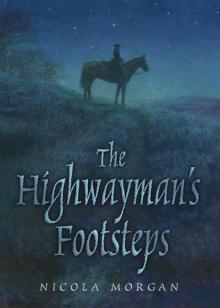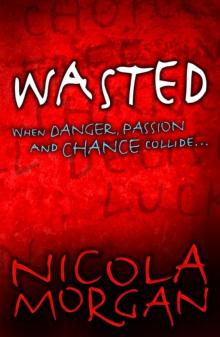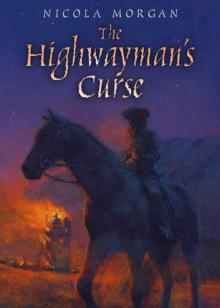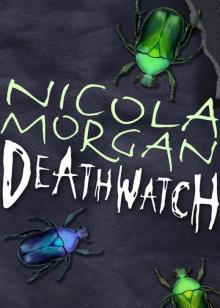- Home
- Nicola Morgan
The Highwayman's Curse Page 3
The Highwayman's Curse Read online
Page 3
The young girl, too, had rushed to his side. She took the dead man’s hands and rubbed them together. If she wanted to bring some life to him, this was a vain action, and she must have known it. The older woman, cradling the child, still knelt on the ground. The older man, standing near her, had not approached the body.
And now it was his expression that caught my eye. Nothing moved on that face – his jaw, his mouth, the flesh beneath his eyes, none of it moved. Not a word, a sound, was uttered. And yet in his eyes was a sadness deeper than words. The open grief of Thomas, the desperate actions of the woman, the tears I now saw on the reddening face of the girl, these were nothing compared with the sorrow of this one man.
And at that moment I knew – the dead man was this man’s father. And seeing his silent grief, I was truly sorry about the old man’s death.
But how could we persuade them that we had not been responsible? And if we could not…?
Chapter Six
The woman now rose awkwardly to her feet and turned to carry the boy inside.
“Hold!” said the silent man now, putting out his hand to touch her shoulder. And he spoke to the child, his finger gently stroking the frightened boy’s cheek. “What did ye see? These men, these lads…” And at this he gestured towards Bess and me. “What did ye see? Did they do this, eh?”
All the boy did was point at us, both of us, his face creasing once more with terror before he buried his head in the woman’s shoulder. Anyone would have thought he was blaming us. Perhaps he was. Perhaps in his confusion he truly believed that we had had some hand in the murder. Who knows? Perhaps he did not see who carried out the killing. Perhaps fear mixed truth and fancy in his thoughts.
“Kill them!” urged one man, I know not which. Angry murmurs of agreement rose from the others. I moved closer to Bess. The young one, the boy of around my age with thick dark hair flopping over his forehead, took the reins of our horses and led them towards the byre. He must not take them! I leapt to follow but rough hands pulled me from behind. I felt a man’s arm round my neck, dragging me backwards, and a knee pressed into my lower back until I crumpled to the ground, where I lay face upwards.
The man pressed his foot onto my stomach and stared down at me, his mouth open so that I could see his grim teeth, with their gaps and crookedness. A large stick was in his hand, held above his red head, ready to fall on me. All my anger had been held back for too long now and I would not be treated like this. I should have lain there passively, but I could not. What I did next was foolish – I know that very well – but … I twisted suddenly round, pushing myself onto my hands and knees before springing upright and turning to face him.
He swung his massive arm back, evil gleaming in his eyes, a grin spreading over his face. I leapt forward, believing I could move faster than he with his greater bulk. I know not why I acted so foolishly. I know only that my horse meant more to me than that man could understand, and that I had not rescued Blackfoot from my bullying brother only for him to be taken away by some stranger.
I was angry with the child for accusing us and with the boy who took Blackfoot and Merlin. I was angry with these people for setting themselves against us for no reason, and with myself for trusting them, and for letting Bess be dragged into such danger. I was angry with myself for being wrong.
And so I leapt forward.
As I did, black stars rained through a red storm and the world disappeared into darkness.
Chapter Seven
I know not how long it was before I awoke. Thoughts tumbled in confusion. The world was spinning. Pain shot through my head, my neck, my arm. My hands were tied behind me, one arm squashed beneath my body where I lay on my side. Sickness, dizzy sickness. I groaned. Before my eyes all was red, black and red, swimming, with stars swirling past. Sickness rose in my throat. I closed them again.
I was cold. Yet my head was hot.
A voice. Bess. But I had drifted away again and could not bring myself to speak a word. I think I mumbled something and then my thoughts tumbled into chaos. I know not for how long, only that my delirium took me on a journey into a dream which had become familiar to me in recent nights.
I found myself, in my confusion, fighting my brother once more, in that duel where at last I had beaten him and taught him to fear and respect me. But now, I did not beat him: now, I was lying, writhing in the mud, while he loomed over me with his sword-tip tracing its way around my throat, his nasty ginger moustache dripping rain, his little eyes gleaming. I could not move and his foot on my chest squeezed the breath from me. Behind him I could see Blackfoot, the wounds on his sides raw from where my brother had used the spurs so cruelly. Somehow my sisters were there, with their silly frills and squeals, their soft satin shoes sodden in the mud. And then I was in thick fog, alone, in a stinking marsh with my feet sinking into the mud. Was that a ghostly horseman through the swirling fog? Was that a light? Did I hear the galloping hoofbeats of pursuing redcoats?
“Will!” It was Bess. I opened my eyes. At first her face was blurred and strange, the surroundings half dark, but quickly my sight adjusted. Everything rushed back to me: the murdered old man, the boy and his broken arm, the men who had taken us. I had been hit from behind. But where was I? No longer outside. In some kind of barn or byre, I guessed. Thin lines of white outlined the shuttered door and a few rays of sunlight pierced the holes in the thatch. Twisting my head painfully, I saw that some light also came through a high window, with partly open shutters. Over there was the shape of something that looked like a plough, and I thought I could smell the vinegar tang of apples that had been stored over winter.
Where were the horses? Blackfoot and Merlin? I struggled to sit up but something tugged at my throat. I was tied by my neck to something I could not see.
Bess was not far away, sitting on the floor with her hands bound behind her. She too was tethered like a horse by the neck to a metal ring above her. I tried to twist my hands but my bonds were too tight. Our saddlebags were gone, along with our few possessions.
“How long have I been here?” My words were thick, my lips stiff as leather.
“I know not. Perhaps three or four hours. Or more. It has seemed a long time. I thought…” She did not need to say what she had thought. She did not ask as to my suffering. I think she was angry with me. “On your head be the consequences,” she had said, yet now she too would bear the results of my decision to help the child.
“What do they plan?” I asked.
“Evil, I fear. The child will not speak. Or cannot. They think we murdered the old shepherd.”
She had been right. But it would not help to dwell on that now. I struggled to think clearly.
“Tell me all you’ve learned. Anything may help us and for certain we need help now.”
Closing my eyes, I tried to slow my spinning head, quell my churning stomach. I let my muscles soften, my neck loosen, wishing for the drumming in my skull to cease. Her words came slowly at first, then more quickly as she remembered more.
The injured boy was called Tam and the old shepherd had been his great-grandfather, Old John. Thomas, the man with the dark beard, was Tam’s father and there seemed to be no mother – the other woman was Tam’s grandmother. Bess said her name was Jeannie. The older man, the quiet man with the trim grey beard, must be Jeannie’s husband, though Bess was not sure. His name was Jock. Bess did not know who the other men or the girl were, though she guessed the red-haired girl was Tam’s sister. He had a brother too, older, but Bess didn’t know his name. There was the boy who had seemed about my age, I remembered – that must be he. And there were two or three other men but Bess did not know their names. Some of the family had gone to church while the others guarded us.
This much she had gathered from their words as they tied our limbs and bundled us into the place where we now found ourselves. She had also heard snatches of conversation from the yard as she waited for me to wake.
But she had some more to tell me: the sheep had disappear
ed and the men talked of reivers – raiders and sheep thieves. Tam had been helping his great-grandfather that evening; they had planned to stay in the shepherd’s hut that night – much against Jeannie’s wishes. But the men were not sure if we were reivers: some said that, since we were English, we must be stealing sheep. Or we could be from one of the landowners to the east, sent to raid and steal during the night. Others talked of someone called Douglas Murdoch, a name which they seemed to hate. And they said if we were from Douglas Murdoch, we would die a horrible death.
Whatever the reason for our being there, the old man was murdered, the sheep were gone and the only witness, an injured boy, was struck speechless with fear of us. We were enemies.
And we could expect their rough justice.
“And the boy? Tam?” I asked. “Why does he not speak?”
“I know not. Each time one of them tries to ask him, he cries and gibbers and seems as if he will fall into a swoon.”
“Have they set his arm?”
“I know not. Nor do I care!” snapped Bess. “He has brought us nothing but trouble. We should have left him, as I said. You should care nothing for him.”
“There is good reason to care,” I replied, my voice level, my eyes still closed against the dizziness. “If they do not set his bones properly, his arm may rot and he may die. If he dies, what will they do to us then? But if I can set his bones and save his arm, perhaps his life, then it will stand us in good stead with his family. He could be our passage to safety. If I even seem to try, it could help us.”
“How can you think you can save his life? What do you know of such things as setting bones?”
Little enough, I must admit, and what I did know came from half-remembered things my father’s stablemen had taught me when a dog had broken its leg. She was perchance right: that I could not save him.
“So we should give up?” I asked. “We should let them kill us?”
“What choice do we have?” When Bess said this, I stared at her through the gloom. Her face hung, sad. I could not see her eyes, but she caught her bottom lip with her teeth, as if forcing tears away.
This was not the Bess I knew. The Bess I had met only a few weeks ago would never give up. The Bess I knew would act with impulse and bravery, with spirit. She had killed a redcoat in cold blood, through the heat of her hatred, for she had sworn death to redcoats after they had killed her father and mother. She had spat in a soldier’s face when he insulted her, without thought of her own danger. She had acted with passion and fury after the death of the young soldier boy, Henry Parish, whom the redcoats chased and killed for the theft of some flour. When we had ridden across the countryside afterwards to bring money to Henry’s starving mother and sister, she had urged me on when I was tired – she would, I think, have ridden to the ends of the earth to fulfil our promise to Henry Parish. And when we had robbed my father’s coach and then again another corrupt gentleman’s carriage near Carlisle, the fire in her eyes, her contempt for danger, her strength, would have put the strongest man to shame.
Where was that fire now?
“Bess?”
After a moment, she lifted her head and looked at me. Then I saw her eyes.
“Bess, where is your spirit? Your father’s spirit?” She simply shook her head, then turned aside, to look at nothing. Her lips tightened as she fought to control herself and twisted the tears away.
This was not Bess. Surely not!
“We can overcome this. We will find a way,” I urged.
She shook her head. “It is pointless to try.”
“Think of Henry Parish! Think of your father and mother! Think of the redcoats!”
“The redcoats have won.” Her voice was flat, with neither fire nor ice.
“No!”
“They burnt everything. Everything is gone.”
And then I understood what had destroyed her spirit. I was silent. The redcoats had burnt her cottage down, the cottage where she had lived alone among her father’s things. They had done it, we knew, because they believed – rightly – that we had tried to protect Henry Parish. No doubt they had hoped to find us there; no doubt they would have killed us. So, in their fury at our absence, they had destroyed her home and almost everything she owned.
A little over two weeks ago this had happened, yet only now, because hope seemed impossible to hold onto, had she finally succumbed.
It was my fault. If we had not gone to rob my father, and if my father had been a better man… But no, I knew she had wanted him to pay as much as I had wished it. It was Bess’s spirit, too, that had brought such things to pass. And now that spirit was broken.
Before I could think of what to say, a noise came from outside. We turned towards the door. Footsteps, and voices. The door was hefted open and daylight streamed in. Two men were silhouetted in the opening. They strode towards us. Without words, they untied our bonds and lifted us roughly to our feet.
Bess did not resist. As for me, dizziness swarmed over me like wasps and I retched and stumbled. Pain shot up my leg as one man kicked me below my knee. I wished to fight but I could not, not with my hands still bound behind me and my head throbbing. But I vowed to keep my wits about me and do what could be done to save us. There must be a way, and I would find it.
The two scraggy lurchers, brindled in colour, sniffed around our feet.
As we were pushed together across the yard, I whispered to Bess, “Do not give up hope. God is on our side.” She looked at me and smiled, the small smile I had come to know so well. It seemed to say, “Little you know.” This time it seemed entirely devoid of hope.
Well, I would show her. There had been a time when Bess knew more than I, but we were equals now, and I could lead as well as she.
Chapter Eight
We were pushed roughly through a low doorway into a place of heat and stench and activity. My eyes darted here and there, taking in now one small detail and then another. Speech seemed impossible, the words sticking to the roof of my mouth. I was like the young boy, Tam, in my helplessness. And perhaps more afraid. For I knew more than he of what men can do. Or mayhap I did not – for young Tam had likely seen the old man’s throat cut.
And there was the child, lying on a thin pallet, with his eyes closed. The woman held his hand and stroked his hair. Little good would that do him. He whimpered every now and then in weakness and pain. Had he a fever? If he had and if I should return a few days later, I think I would not see him alive. But then, perchance he might say the same of me.
The two dogs went to the fire, where they curled up together.
A single room made up this large dwelling. A fire blazed at one end of the cottage, a chimney hood above it with a large pot hanging from the crook. The red-haired girl stirred the contents of the pot. She looked not at me, though I could see her eyes swollen from crying. She stirred and stirred, as though stirring was all she could or wished to do.
A large box-bed filled one corner, the heavy curtains almost closed. On the other side of the fire sat an old woman, in a chair shaped like an up-ended coracle, the back and sides of woven basketwork, enclosing her. Her arms were wrapped round herself. She did not shift her gaze towards us as we entered, seeming in some faraway place of her own.
Wooden shutters blocked the light from the two small windows and, apart from some tallow candles leaning drunkenly and spluttering as their wax spilled, the dwelling was lit only by the fire and the sunshine flooding through the door. The room glowed a burnished copper, though the corners were thick with darkness.
A haze of smoke filled the dwelling.
Three men sat on stools round a scrubbed table in the middle of the space. One of them, the fiery-haired man with the scar, clasped a pottery cup in his thick hands. Thomas and the older man sat with cups before them, but they seemed not to drink. The older man watched us closely, and silently, as we were pushed towards him.
I looked carefully at his face, the cheeks creased like dry leather. I could not tell if he was kind a
nd good, or not. But this was the man who would decide our fate, I knew. There was a distant pain in his eyes, a weariness perhaps. I thought then that he was worn down by sorrow at the death of his father.
My head still hurt. Saliva pooled in my mouth and I thought I might collapse.
He spoke, and his voice was pleasant enough, smooth and musical and slow, the words plain through his strange accent. His voice reminded me of a teacher I had had once, who spoke quietly but whose voice commanded attention.
“We have need o’ your help. Such an argument have we had.” His eyes remained cold and steady. I thought he was a man I need not fear if I told the truth.
“Get on wi’ ye,” snarled the man with the fiery hair. “I’ll no’ see my father turn soft on some o’ Douglas Murdoch’s men.” He took a mouthful of the drink in his cup and a biting reek of strong spirit came over me.
Thomas turned on him. “Dinna speak to our father so! Have some respect! And ye’re drinking o’er much – ‘tis no’ right on the Sabbath!”
“Hold your tongues, the both o’ ye!” said their father, exasperation snapping in his voice. Thomas flashed a look of anger towards his brother, who returned the look.
As the older man began to speak again, I could see behind him the ancient woman hunched in her chair. Near her was a spinning-wheel, and the unbidden image of a huge spider came to my mind. Her eyes were black, and her clothes dark brown, but her hair was white as seafoam and wound round her head many times. Turned as she was a little to one side, only her right cheek was visible to me: its skin was, I think, the most wrinkled I had ever seen, as though if you stretched it out it would have wrapped around her body like a fine cloak. But it was as she moved her head the other way that I saw something to turn my stomach.
Her left cheek was horrible to behold, smooth and white in the sunken pit of a broad scar, the skin stretching too tightly between nose and cheekbone and ear, pulling her nose over, tugging her lip upwards, drawing her lower eyelid downwards. It was a terrible injury, deforming.

 The Highwayman's Footsteps
The Highwayman's Footsteps Wasted
Wasted The Highwayman's Curse
The Highwayman's Curse Deathwatch
Deathwatch